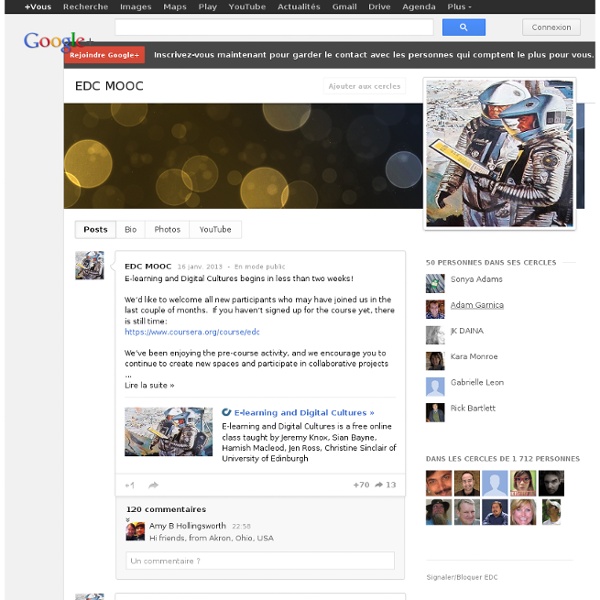



edcmooc - home teachers' blog Edinburgh's Coursera-based Moocs attract 300,000 KEYCLOAK_3P_COOKIEThis cookie is necessary for the login function on the website. Maximum Storage Duration: SessionType: HTTP Cookie KEYCLOAK_3P_COOKIE_SAMESITEThis cookie is necessary for the login function on the website. didUnique id that identifies the user's session. Maximum Storage Duration: 1 yearType: HTTP Cookie did_compatEnsures visitor browsing-security by preventing cross-site request forgery. geoCountryThe cookie determines the preferred language and country-setting of the visitor - This allows the website to show content most relevant to that region and language. siteCountryPending Maximum Storage Duration: 400 daysType: HTTP Cookie test_rudder_cookieThis cookie determines whether the browser accepts cookies. #.#-#-#-#-#.ackUsed to contain user’s survey and quiz answers in Local Storage. Maximum Storage Duration: PersistentType: HTML Local Storage #.#-#-#-#-#.inProgressUsed to contain user’s survey and quiz answers in Local Storage. _com.auth0.auth. AnonymousUserIdPending JSMRIPending
Mi Blog Coursera blog aggregator no trash project edcmooc" flickriver practice artefacts Badge creator Use Flickriver Badge Creator to create a badge linking to your photos, your group or any other Flickriver view. You can place your badge on your Flickr profile, Blog or Website. Add to your iGoogle or Netvibes page Flickriver widget for iGoogle or Netvibes can display almost any Flickriver view - most interesting today, by user, by group, by tag etc. Clickr on one of the buttons below to install: Embed on your Web site To embed this view, Copy and Paste the following HTML code: Black background (preview): White background (preview): Firefox and Chrome addons Adds a 'Flickriver' button to your browser. Install in FirefoxInstall in Chrome Search plugin Add 'Search on Flickriver' to your browser's search box. "View on Flickriver" Greasemonkey script A Greasemonkey script that adds Flickriver links to various Flickr photo pages - user photos, favorites, pools etc, allowing to quickly open the corresponding Flickriver view. Install "View on Flickriver" script Bookmarklet
40 Useful Tips For Anyone Taking A MOOC As these resources have grown in number and the list of institutions providing them has become ever more prestigious, free online courses are gaining legitimacy with employers as a method of learning valuable job skills. While there’s still a long way to go in terms of acceptance, more and more employers are recognizing the value of cheap, effective educational programs that can keep employees up-to-date and engaged in their field without spending a dime. Whether you’re looking to online education for personal reasons or to get ahead in your career, use these tips to help you get more out of open courses and use what you learn to market yourself, improve your performance, and stand out on the job. Treat them like real classes . If you really want to take away a lot from a free online course, then don’t treat it any differently than you would a course you’ve paid to take.
Construction of Digital Identities and 2.0 Democracy | Productos Socialmente Irresponsables Since the arrival of new technologies has become a constant in modern world (starting with the massification of printing technologies, that marks the start of modern states, going through books and newspapers, radio, magazines that took advantage of the massification of photography, and television) the necessity to adapt and adopt such technologies in order to maintain social control and cohesion has kept the academics, social communicators, publicists, political scientists and media managers busy trying not only to anticipate what would be the next loop in history of mass media, but also to control interactions to their benefit. Regardless if whether we are talking about state, media conglomerates, large corporate holdings that attempt to build market share or simply informed citizens, all of us have been subject of a quick mind and life transforma- tion whose total effects have not been predicted yet. Lincoln Dahlberg - Me gusta:
Our #EdcMooc paths to Information and knowledge | Eleni's First Steps The last three weeks have been extremely rich and creative although I haven’t come back to the blog to record my thoughts. One of the things that keeps coming back in my mind are the words of George Roberts few months ago when I started the first UK-based MOOC “First Steps in Learning and Teaching in Higher Education“. During the orientation, George encouraged us to dive into the #fslt12 curriculum (the hashtag of the aforementioned MOOC) and make it ours. George’s words make perfect sense to me while engaging with #edcmooc as a student and while trying to encourage, as an educator, my students to internalize their course content and experience it as a whole. By internalizing the course content, quite a few questions keep coming up and the “dialogic” engagement via the Twitter chat revealed that I am not the only one with many research questions. This experience is going to help me immensely in a PhD program…so many research questions swirling through my head! What do you do? Like this:
Continuing the 2013 #edcmooc & #edcmchat community